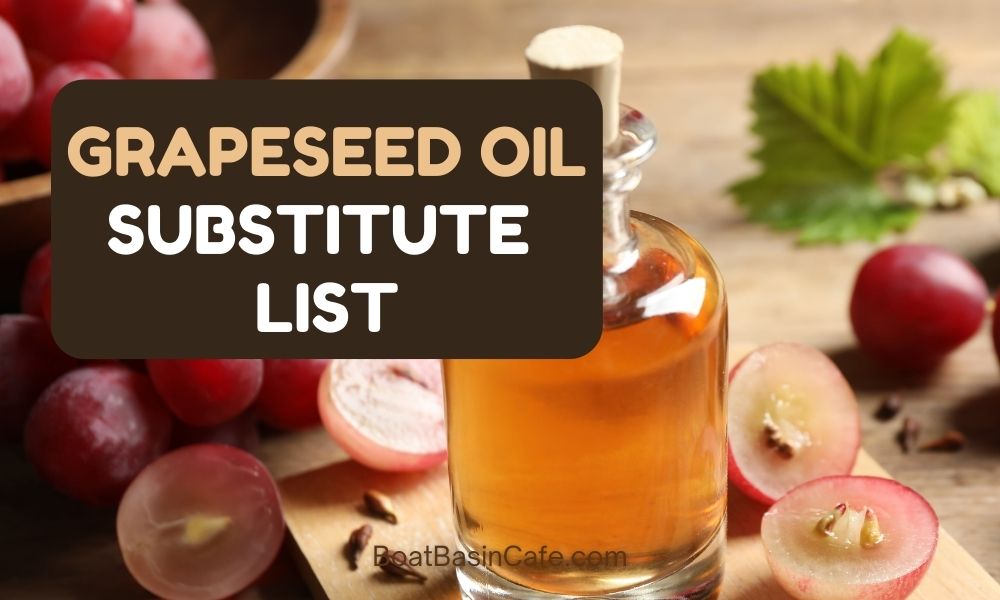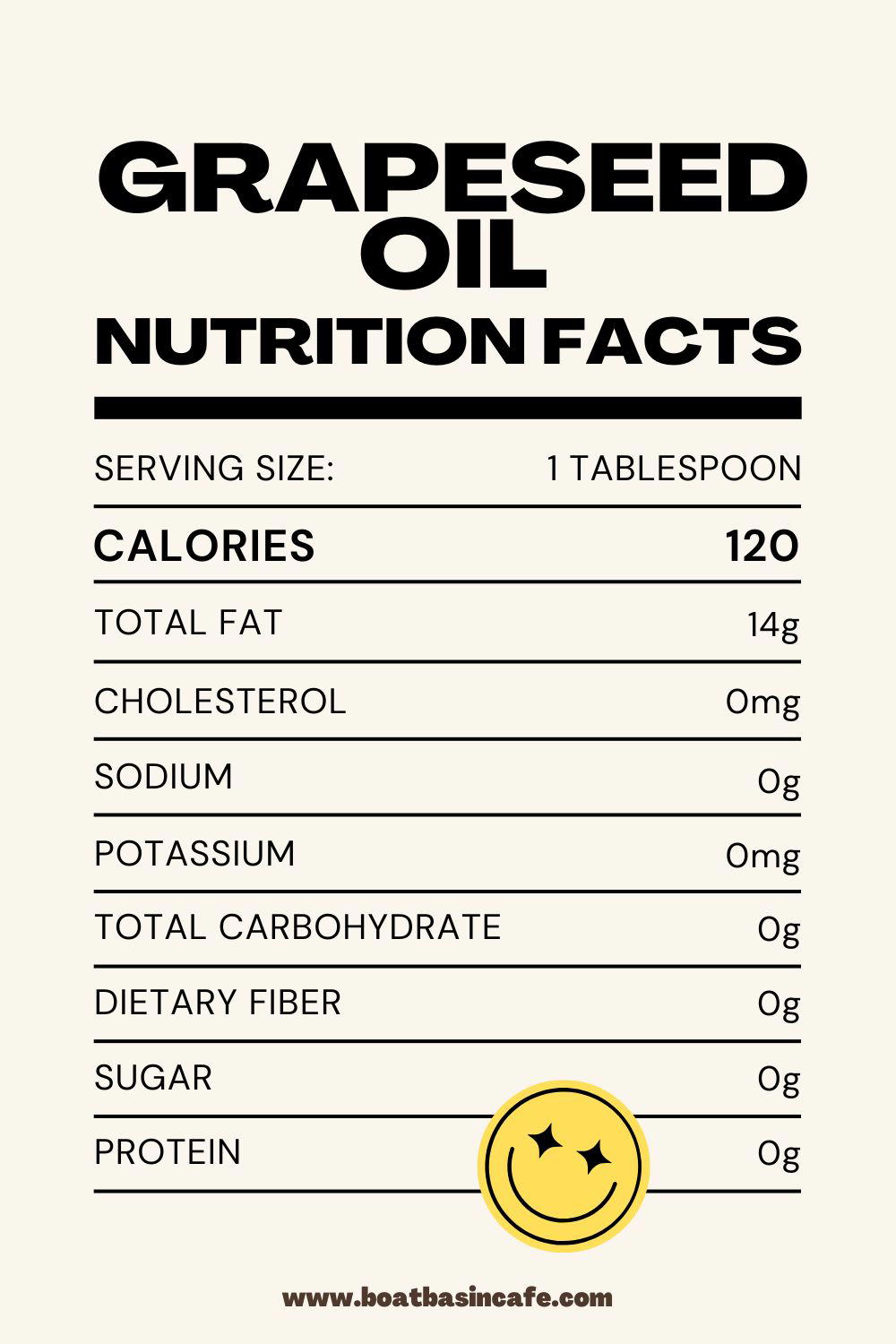Find out the best substitute for grapeseed oil, their health benefits, what they are used for, and all the important details to help you make the right choice.

There are some recipes in our family that require using grapeseed oil. However, it can be hard to find in stores. But the good news is you can get a substitute for grapeseed oil, depending on what you need it for. If I need it for cooking, any neutral oil like canola or vegetable oil will do so that my dish retains the prominent flavor. Sometimes I tend to switch oils for better health so I go for an oil that’s high in polyunsaturated fats, like sunflower or corn oil.
Check out this list of the best substitutes for grapeseed oil.
What Is Grapeseed Oil?
A byproduct of manufacturing wine is grapeseed oil. Grape seeds are left over after pressing grapes to make wine. These discarded grape seeds are used to make grapeseed oil. Grapeseed oil is used as a natural skincare. Additionally, it is promoted as a healthy substitute for vegetable oil. With a hint of nuttiness, grapeseed oil has an overall neutral flavor with a clean taste and can be used for all sorts of cooking.
Is Grapeseed Oil Good For You?

Grapeseed cooking oil has a high content of polyunsaturated fats which is mostly omega-6 fatty acids. While too much of this can cause health problems according to some studies, there’s yet to be any conclusive evidence. Grapeseed oil also contains Vitamin E which is an antioxidant that protects us from harmful radicals.
There is some debate over the health benefits of grapeseed oil, particularly because of the way the oil is prepared. Chemical solvents like hexane are used to produce grapeseed oil that is sold commercially. Hexane is categorized as a neurotoxin and an air contaminant. It is yet to be found what impact ingesting these solvents in trace doses has on people. During processing, grapeseed oil may also be heated to extremely high temperatures, which could cause the oil to oxidize and spoil.
Cold-pressed or expeller-pressed grapeseed oil is produced without heat or chemical solvents. Instead of solvent-produced oil, this is a better option.
Although the high smoke point of 420°F (216°C) of grapeseed oil makes it a good choice for baking, cooking, and adding to salads, the high content of polyunsaturated fats reacts with oxygen in high heat and can spoil the oil and release free radicals that can damage your cells. That’s why it’s not recommended to use grapeseed oil for frying.
Note: The smoke point of an oil is the temperature at which the oil starts to break down. Heating it above its smoke point will destroy the flavor, and the nutrients, and release harmful free radicals.
Substitute For Grapeseed Oil: Top 9 Healthy Alternatives
| Pros | Cons | Best For | |
| Vegetable Oil | Neutral flavor Heart-healthy | Hydrogenated form is not good for the heart | All types of cooking and baking |
| Avocado Oil | Slightly nutty flavor Multiple health benefits | Flavor is not neutral | Baking, salad dressings |
| Almond Oil | Mild nutty flavor Multiple health benefits | Flavor is not neutral Needs pairing with complementary flavors | Baking |
| Canola Oil | Light flavor | Grilling, baking, salad dressing | |
| Peanut Oil | Health benefits | High in saturated fats | Stir-frying |
| Sunflower Oil | Highly versatile Full of nutrients | Can spoil fast | Frying, stir-frying, deep-frying, roasting, sautéing, and baking |
| Corn Oil | Affordable Heart-healthy | Deep frying | |
| Safflower Oil | No flavor | May be allergic for some | Frying, salad dressings |
| Olive Oil | Full of health benefits | All types are not suitable for all dishes | Light olive oil for cooking and baking Extra virgin olive oil for dips, soups, salads |
01 Vegetable Oil
Typically, canola, coconut, corn, cottonseed, olive, palm, palm kernel, peanut, safflower, soybean, and sunflower oils are blended to make vegetable oil so you can use any of these as substitutes for vegetable oil. Vegetable oil is an excellent substitute for grape seed oil and a great ingredient for baking because it has a neutral taste and a smoke point of about 400°F (204°C). Vegetable oil contains significant amounts of polyunsaturated fats, one of the good fats that are necessary for a balanced diet and can help reduce the risk of coronary heart disease. However, beware of hydrogenated vegetable oil in packaged foods as these contain trans fats that can cause heart diseases.
02 Avocado Oil
With a high 520°F (271°C) smoking point, avocado oil is ideal for high-temperature cooking and has a subtle nutty flavor that won’t overpower other flavors, making avocado oil the right replacement for grapeseed oil. As a base for salad dressings, it tastes exceptionally well and is also excellent for baking recipes. The health advantages of avocado oil are similar to those of grape seed oil. It’s loaded with heart-healthy monounsaturated fats like oleic acid and omega-9, which helps lower cholesterol and enhance heart health. It’s also a wonderful source of vitamin E which is great for your skin.
03 Almond Oil
Almond oil is an excellent grapeseed oil alternative when it comes to baking. It has a mild nutty flavor that goes well with many baked goods. It has the same smoke point as grape seed oil, which is around 420°F (215°C). Although it has a moderate flavor, almond oil is not quite as neutral as grape seed oil, so you should combine it with other flavors that go well. Almond oil is loaded with healthy ingredients, much like grape seed oil. It has a lot of beneficial polyunsaturated fats, is low in saturated fat, and is a wonderful source of vitamin C.
04 Canola Oil
Canola oil substitute grapeseed oil is a great choice for cooking. Due to their close similarities, canola oil is the ideal alternative to grapeseed oil. Rapeseed is the source of canola oil, which is light in color and flavor. It is a good source of omega-3 fatty acids and monounsaturated fats that are healthy for your heart according to the American Heart Association. With a smoke point of 400°F (204°C), it can be used for a variety of cooking methods, including grilling, baking, and dressing salads. So, if you are wondering can I substitute grapeseed oil for canola oil, you absolutely can!
05 Peanut Oil
The smoke point of this high-heat oil is roughly 450°F(232°C), making it a popular oil for stir-frying Asian cuisine. Plus, its slightly nutty flavor and sweet taste add to the earthiness of the dish and makes it flavorful without being overpowering. If you’ve run out of peanut oil, use one of the 10 best oils you can use as peanut oil subs.
Peanut oil is also rich in monounsaturated fats that can help regulate your cholesterol level and vitamin E that’s essential for maintaining skin health. So, both in terms of cooking oil replacement and health benefits, it can stand in place of grapeseed oil in your cooking. However, peanut oil has a high content of saturated fats, so use it in moderation.
06 Sunflower Oil
When it comes to frying, this is the standard oil, and for good reason. Sunflower oil is perfect for frying, stir-frying, deep-frying, roasting, sautéing, and baking due to its extremely high smoke point of 450°F(232°C) and mild nutty taste. There are various types of sunflower oil, some of which are healthier than others. High oleic sunflower oils, or mono- and polyunsaturated fat-rich sunflower oils, can raise good cholesterol and lower bad cholesterol. Just remember that sunflower oil can spoil quickly and it’s best to refrigerate it. If you’re thinking does oil go bad, you might be surprised!
07 Corn Oil
The oil that is produced from the germ of the maize plant is called corn oil, and it is relatively inexpensive. The healthiest substitute is organic, cold-pressed corn oil since it contains mono- and polyunsaturated fats that support healthy cholesterol levels. Corn oil would be a perfect grapeseed oil alternative for deep frying due to its health advantages and smoke point of 410°F(210°C).
08 Safflower Oil
Safflower oil is flavorless and rich in monounsaturated and polyunsaturated fats, much like sunflower oil. It has a high burn point of about 510°F(265°C), which makes it suitable for frying, and it doesn’t harden when chilled, which makes it perfect for salad dressing. However, if you’re allergic to safflower, it’s better to avoid using safflower oil.
09 Olive Oil
Can you substitute grapeseed oil for olive oil is a common question. You can but you need to know the types of olive oils. Extra virgin olive oil is made from the first press of olives, has a higher content of antioxidants, is more acidic in taste, and has a green tinge. Virgin or light olive oil is produced from the second press and has a lighter flavor. It is yellow or champagne in color.
Extra-virgin olive oil has a smoke point of around 325°F (163°C) and works well as a finishing oil for dips, salads, soups, bread, and salad dressings or emulsifying component when making homemade mayonnaise. Light olive oil, on the other hand, has a light, smooth, and subtle taste, with a higher smoke point of about 465°F (163°C), making it good for baking and cooking.
Olive oil is high in monounsaturated or healthy fats, vitamin E, and omega-3 fatty acids, which lowers the risk of heart disease and stroke.
Note: Coconut oil is not part of this list as it’s high in saturated fats that are not heart-healthy.
Canola Oil Vs Grapeseed Oil
In the grapeseed oil vs canola oil debate, both cooking oils are good for your heart. Their high unsaturated fat content encourages healthy cholesterol levels. High quantities of important omega fatty acids are also present in both oils. However, the canola vs grapeseed oil discussion cannot ignore that canola oil offers more health advantages than grape seed oil since it contains more omega-3 fatty acids and vitamin E while having lower levels of saturated fat.
FAQs
What Is The Best Substitute For Grapeseed Oil In Baking
As a grapeseed oil substitute for baking, use light olive oil, vegetable oil, avocado oil, or sunflower oil.
Can I Use Grapeseed Oil Instead Of Olive Oil?
Can you use grapeseed oil instead of olive oil can be an option for baking. Grapeseed oil in place of olive oil won’t have the same flavor.
Can You Substitute Olive Oil For Grapeseed Oil?
In most recipes, light olive oil works well as a grapeseed oil substitute. On the other hand, because extra virgin olive oil has a lower smoke point and a stronger flavor, it is not a great replacement.






